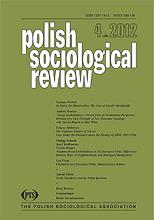The Cognitive Closure of Science. Case Study:the Discourse about the Etiology of Aids, 1981-1986
The Cognitive Closure of Science. Case Study:the Discourse about the Etiology of Aids, 1981-1986
Author(s): Łukasz AfeltowiczSubject(s): Social Sciences
Published by: Polskie Towarzystwo Socjologiczne
Keywords: black box; scientific discourse; HIV/AIDS; sociology of scientific knowledge; self-referential system
Summary/Abstract: As the sociology of scientific knowledge has revealed, research fields may frequently maintain or legitimize hypotheses independently or in the absence of experimental data or other empirical evidence constituting conclusive scientific proof in accordance with declared methodological standards. This essay aims to show certain of the mechanisms and social factors that allow scientific discourse to function as a self-referential system, i.e., in an autonomous manner in regards to the border conditions of empirical experience, as described by W. Quine. I particularly concentrate here on how the organization of scientific work in selected disciplines can result in the local findings of individual laboratories being quickly transformed into unrevisable facts (black boxes). The phenomenon of the self-reference of scientific discourse is well illustrated by the case of the debate on the cause of AIDS. This discourse was so configured that by referring to one another and by theoretical imputation researchers caused the hypothesis on the causal relation between HIV and AIDS to begin to be accepted as an indisputable fact, even though the corroborating evidence had not appeared in the meantime.
Journal: Polish Sociological Review
- Issue Year: 180/2012
- Issue No: 4
- Page Range: 497-521
- Page Count: 24
- Language: English

